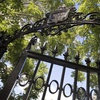{shortcode-65132f09a7ff7fab067d60af730f2fd01a7edaca}
Former Harvard President Lawrence H. Summers slammed Harvard’s leaders on Wednesday for acting too slowly against campus protesters and academic centers he accused of spreading antisemitism — which, he said, gave the Trump administration a window to threaten the University.
Speaking at a virtual event with Samuel W. Lessin ’05 hosted by the 1636 Forum — an alumni-led group founded by Lessin in 2023 to advocate for academic freedom and institutional accountability at Harvard — Summers said the Harvard Corporation, Harvard’s highest governing body, had failed to serve as decisive public-facing leadership in a time of crisis.
Summers has emerged as a leading public voice condemning the Trump administration’s use of funding cuts to extract concessions from universities. But he has also repeatedly called on Harvard to crack down on pro-Palestine protesters and certain academic programs, saying it failed to curb antisemitism, and has been a critic of diversity initiatives.
“A central obligation of the board is to mediate the margin between the internals of the institution and the larger society within which it is embedded,” he said. “It should be the responsibility of the Harvard Corporation to take responsibility for making sure that there is discipline when there are instances of disorder or rule-breaking.”
Summers warned that recent reforms could lose their legitimacy if the public perceives them as responses to political pressure from the Trump administration, which has threatened to revoke nearly $9 billion in research funding from Harvard and affiliate hospitals unless it complies with a set of directives related to diversity, equity, and inclusion programming and campus protest policies.
“If we make a set of good choices but are seen as making those choices in a capitulation to what President Trump is doing, we will discredit those good choices,” he said. “We might set back the cause of moving in the right directions in a very, very strong way.”
Summers expressed support for several recent actions at Harvard — including the dismissal of leadership at the Center for Middle Eastern Studies, the School of Public Health’s suspension of its partnership with Birzeit University in the West Bank, and changes to the Divinity School’s Religion and Public Life program — but said he did not approve of the way they were presented.
“I only wish that Harvard had acted much more decisively with respect to them, so that those were seen unambiguously as what they should be — acts of proper principle and leadership on our part, rather than as part of some overall positioning exercise with respect to the Trump administration,” he said.
Summers pointed to the presidential task force on antisemitism and anti-Israel bias, announced in January of last year, as emblematic of Harvard administration’s sluggishness.
“I’m not sure that we needed any task force with respect to discrimination and antisemitism, and we certainly didn’t need a task force that has taken 18 months and has not yet reported,” he said.
Harvard’s task force on antisemitism has yet to issue a final report of the results of its investigation. Its formation was in fact announced just more than 14 months ago, but a separate, abortive effort began 18 months ago under former Harvard President Claudine Gay.
University spokesperson Jason A. Newton declined to comment on all of Summers’ claims but referred to the task force’s preliminary recommendations and a webpage on how Harvard has moved to implement them.
“We need a much stronger way to identify and take necessary actions,” Summers added. “That is what I think is the burden that rests with the University’s internal leadership.”
Summers said Harvard’s administration had damaged its reputation by not condemning antisemitism with sufficient force.
“There has been a reluctance to speak out against it, and I think that has very much compromised Harvard’s standing,” he said.
He pointed to former President Drew G. Faust’s response to a planned Satanic “black mass” in 2014 as a model of moral clarity for Garber to follow.
“What she said was that they had their free speech rights and she had hers, and she suspected most other members of the community found what they were doing deeply offensive and repugnant,” he said. “I asked myself why there has been no parallel response to groups on our campus who have celebrated Hamas terrorism.”
While Summers repeatedly criticized the University’s leadership throughout the forum, he offered praise for Garber’s actions on academic freedom.
“We have taken a substantial number of positive actions,” he said. “And I salute President Garber for that. I think in many ways, he’s been a breath of fresh air on these issues.”
—Staff writer Saketh Sundar can be reached at saketh.sundar@thecrimson.com. Follow him on X @saketh_sundar.
Read more in University News
Harvard Medical School Launches Open Inquiry Working Group












